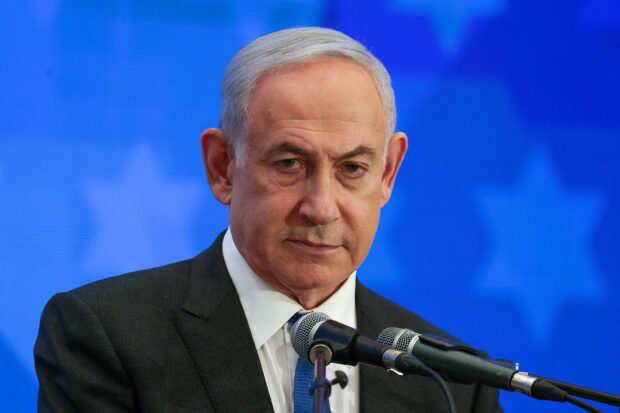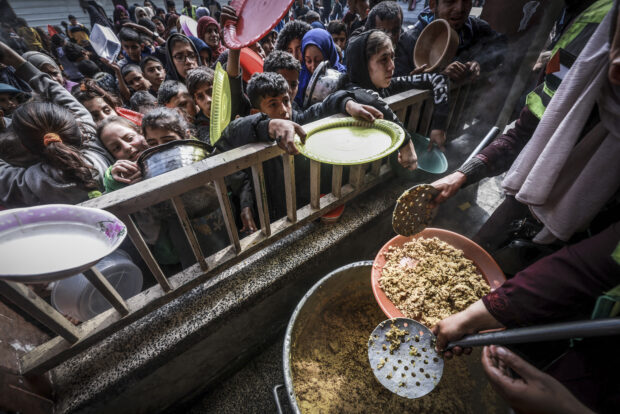Israel’s Netanyahu approves new Gaza ceasefire talks

FILE PHOTO: Israeli Prime Minister Benjamin Netanyahu addresses the Conference of Presidents of Major American Jewish Organizations, amid the ongoing conflict between Israel and the Palestinian Islamist group Hamas, in Jerusalem, February 18, 2024. REUTERS/Ronen Zvulun/File Photo
Palestinian Territories — Israeli Prime Minister Benjamin Netanyahu gave the go-ahead Friday for a new round of talks on a Gaza ceasefire, a day after the world’s top court ordered Israel to ensure aid reaches desperate civilians.
But despite a binding UN Security Council resolution earlier this week demanding an “immediate ceasefire”, fighting raged on unabated in Gaza Friday, including around its few functioning hospitals.
The health ministry in the Hamas-run territory said dozens of people were killed overnight.
Among them were 12 people killed in their home in the southern city of Rafah, which has been bombed repeatedly ahead of a threatened Israeli ground operation.
Men worked under the light of mobile phones to free people trapped under the debris, AFPTV images showed.
Regional fallout from the conflict also flared, with Israel saying it killed a Hezbollah rocket commander in Lebanon and a war monitor saying that Israeli air strikes killed several Hezbollah fighters in Syria.
Netanyahu’s office said new talks on a Gaza ceasefire and hostage release will take place in Doha and Cairo “in the coming days… with guidelines for moving forward in the negotiations”.
Those talks had appeared deadlocked in recent days despite a major push by the United States and fellow mediators Egypt and Qatar to secure a truce in time for the Muslim fasting month of Ramadan, now more than half way through.

Displaced Palestinian children gather to receive food at a government school in Rafah in the southern Gaza Strip on February 19, 2024, amid the ongoing battles between Israel and the militant group Hamas. (Photo by MOHAMMED ABED / AFP)
Famine ‘setting in’
In its ruling, the International Court of Justice (ICJ) in The Hague said it had accepted South Africa’s argument that the further deterioration of the humanitarian situation in Gaza required Israel to do more.
“Palestinians in Gaza are no longer facing only a risk of famine, but… famine is setting in,” it said.
Philippe Lazzarini, head of the UN agency for Palestinian refugees, said the ruling was “a stark reminder that the catastrophic humanitarian situation in the Gaza Strip is man-made (and) worsening”.
A UN-backed report released last week warned that half of Gazans are feeling “catastrophic” hunger and projected imminent famine in the territory’s north.
The Israeli defence ministry body responsible for Palestinian civil affairs (COGAT) hit back on Friday, alleging the assessment contained inaccuracies and questionable sources.
The ICJ had ruled in January that Israel must facilitate “urgently needed” humanitarian aid to Gaza.
The latest binding ruling by the court, which has little means of enforcement, came as Israel’s military said it was continuing operations in Gaza’s largest hospital Al-Shifa for a 12th day.
Fighting around Gaza hospitals
The United Nations says Gaza’s health system is collapsing “due to ongoing hostilities and access constraints”.
Israel’s military accuses Hamas and the Islamic Jihad of hiding inside medical facilities, using patients, staff and displaced people for cover — charges the militants have denied.
On Friday the army said it was “continuing precise operation activities in Shifa Hospital” where it began a raid early last week.
Troops first raided Al-Shifa in November, but the army says Palestinian militants have since returned.
About 200 militants have been killed during the latest Al-Shifa operation, it said.
In north Gaza’s Shati refugee camp, Amany, a 44-year-old mother of seven, described how it felt to live under relentless Israeli bombardment.
“Explosions and air strikes go on throughout the night, it’s petrifying,” she said. “I feel like I’m living a continuous nightmare that doesn’t want to end.”
Netanyahu said on Thursday that troops “are holding the northern Gaza Strip” and also the southern city of Khan Yunis, amid heavy fighting.
Near Al-Amal Hospital in Khan Yunis, troops carried out “targeted raids on terrorist infrastructure”, killing dozens in combat backed by air support, the army said on Thursday.
Israeli tanks have also surrounded another Khan Yunis health facility, the Nasser Hospital, the Gaza health ministry said.
Syria, Lebanon strikes
The war began with Hamas’s October 7 attack that resulted in about 1,160 deaths in Israel, mostly civilians, according to an AFP tally of Israeli official figures.
Israel’s retaliatory campaign against Hamas has killed at least 32,623 people, mostly women and children, according to health ministry figures.
Palestinian militants also seized about 250 hostages. Israel believes about 130 remain in Gaza, including 33 who are presumed dead.
Since the Gaza war began, Israel has increased its strikes in Syria, targeting army positions and those of Iran-backed forces including Lebanon’s Hezbollah movement, a key Hamas ally.
A Britain-based war monitor, the Syrian Observatory for Human Rights, said Israeli air strikes killed seven Hezbollah fighters.
The Israeli military said it killed the deputy commander of Hezbollah’s rocket unit in south Lebanon, Ali Abdel Hassan Naim, in an air strike.
Israeli Defence Minister Yoav Gallant toured the army’s northern command on Friday “to closely examine another successful termination like the one that was executed this morning”, he said in a post.
Gallant said the army would keep up its operations against Hezbollah, and its leader Hassan Nasrallah was to blame for the consequences, including members killed and wounded.
“We will make them pay a price for every attack that comes out from Lebanon,” he said.
Recent days have seen an uptick in deadly exchanges, and the White House has called on both Israel and Lebanon to put a high priority on restoring calm.